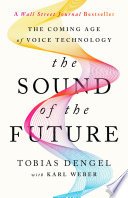The Sound of the Future by Tobias Dengel — Book Review
In the ever-evolving landscape of technology and communication, where our devices have become extensions of our very selves, it’s hard not to wonder: what defines the next frontier of human interaction? Is it the tactile feedback of our smartphones, the immersive allure of VR, or could it be something more elemental, like the sound of a voice? Tobias Dengel’s “The Sound of the Future” explores this intriguing question, diving into the burgeoning realm of voice technology and its potential to revolutionize how we experience the world around us. This book offers a fascinating lens into a future where our voices—and the devices that listen to them—might just become the primary interfaces of our digital lives.
From the outset, “The Sound of the Future” envelops you in a tone that’s both insightful and accessible. Dengel writes with a clarity that’s refreshing in a subject often mired in technical jargon, making complex concepts understandable without diluting their significance. The pacing is brisk yet measured, inviting the reader on a journey that feels both enlightening and engaging. It’s a book that’s clearly aimed at a variety of audiences: tech enthusiasts eager for a glimpse into the future, industry professionals looking for a deeper understanding of voice technology, and even the casual reader curious about how their everyday interactions might soon change. Dengel’s approach is conversational, much like a seasoned journalist explaining the intricacies of a new gadget, making it a perfect fit for those who appreciate a blend of narrative storytelling with a side of technical depth.
At its core, “The Sound of the Future” builds its arguments around the idea that voice technology is not just another trend but a paradigm shift in how we interact with technology. Dengel posits that while screens have dominated our attention for decades, voice technology is poised to take the lead, offering a more natural and intuitive form of interaction. He delves into the progression of voice recognition software, the advancements in natural language processing, and the integration of AI—all of which are paving the way for a seamless voice-driven future. Dengel also explores the societal implications, questioning how this shift might affect privacy, accessibility, and the very fabric of human communication. By examining these core ideas, the book provides a comprehensive overview of the current state and future potential of voice technology without getting bogged down in the minutiae.
Dengel’s exploration doesn’t stop at the technical aspects; he connects these innovations to broader themes and current events, adding layers of relevance. For instance, he draws parallels between the rise of voice technology and historical technological shifts, such as the advent of the personal computer or the smartphone revolution. This comparison provides context, helping readers understand the magnitude of what voice technology could achieve. Additionally, Dengel touches on the cultural and ethical considerations, such as the balance between convenience and privacy in a world where devices are always listening. These discussions are reminiscent of ongoing debates about data security and digital privacy, making the book timely and resonant with current technological discourse.
Personally, reading “The Sound of the Future” reshaped my understanding of how technology can evolve our interactions. It prompted me to reconsider the subtle ways in which our voices already interact with technology, from dictating messages to asking virtual assistants for the weather. The book opened my eyes to the notion that voice could become as integral to our digital lives as touchscreens once did. This reflection underscores the potential for voice technology to democratize access to information, making tech more inclusive for those who might struggle with traditional interfaces. It’s a gentle reminder of the power of innovation when directed towards enhancing human experience rather than merely advancing technological prowess.
As we conclude this exploration of Tobias Dengel’s “The Sound of the Future,” it’s clear that the book is a must-read for anyone intrigued by the intersection of technology and human interaction. It’s not just a book for tech aficionados but for anyone interested in understanding where our digital lives are headed. Dengel’s insights offer a compelling vision of a future that is both ambitious and inevitable, urging readers to imagine a world where our voices hold sway over the digital realm. By the book’s end, you’re left with a sense of anticipation and curiosity about what’s to come—and a keen understanding that the sound of the future might just be your own voice. Whether you’re a tech-savvy individual or someone who simply marvels at the pace of innovation, “The Sound of the Future” invites you to listen, reflect, and engage with the possibilities of a voice-driven world.

The Sound of the Future
Author: Tobias Dengel
Publisher: Hachette UK
Published: October 10, 2023
Get the book